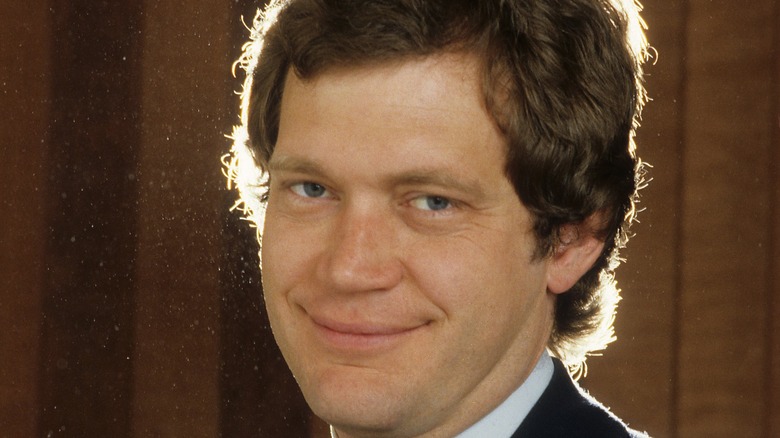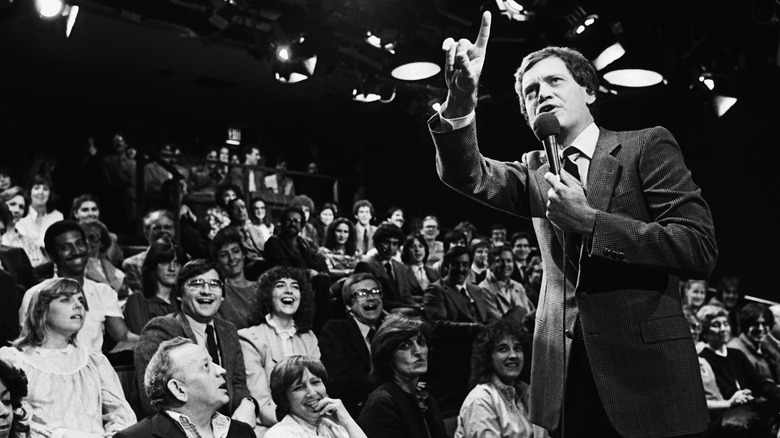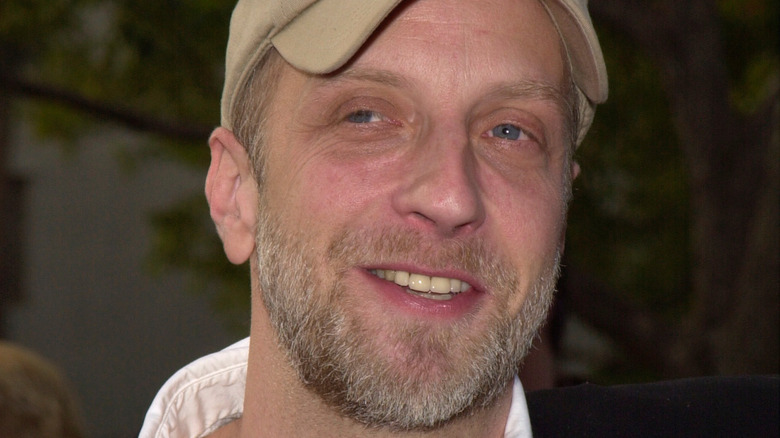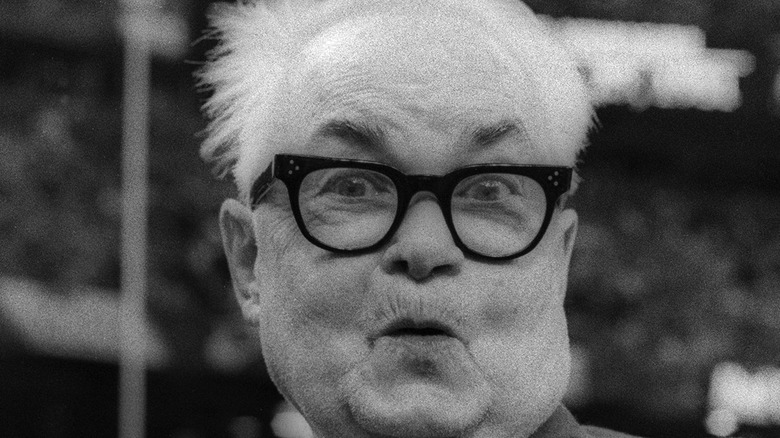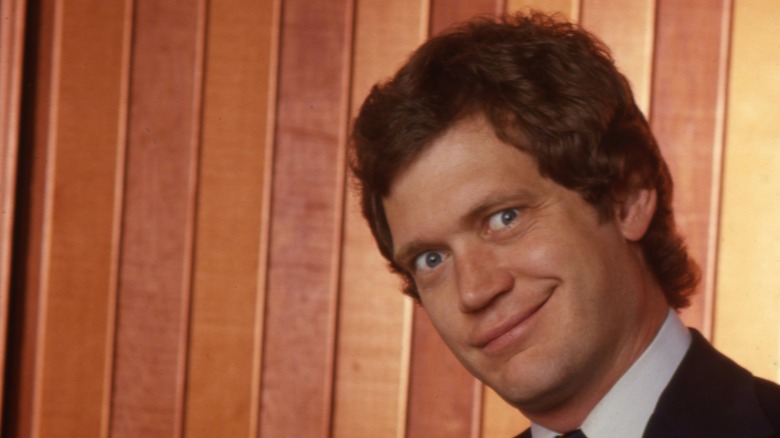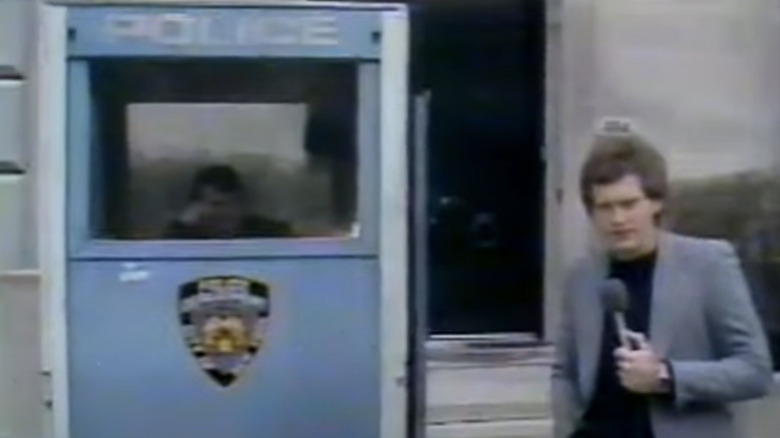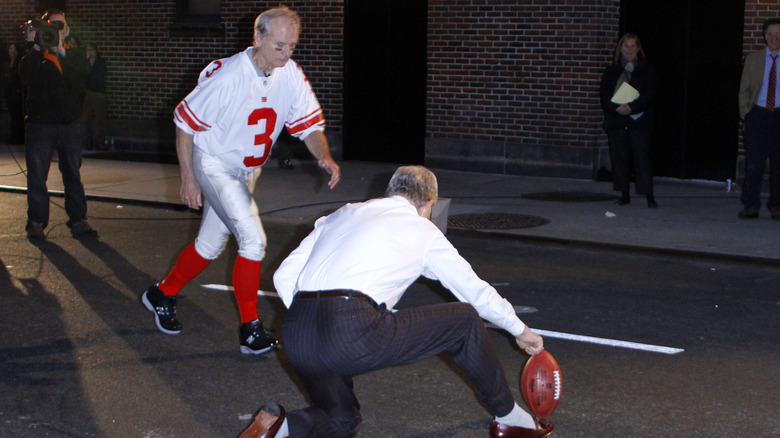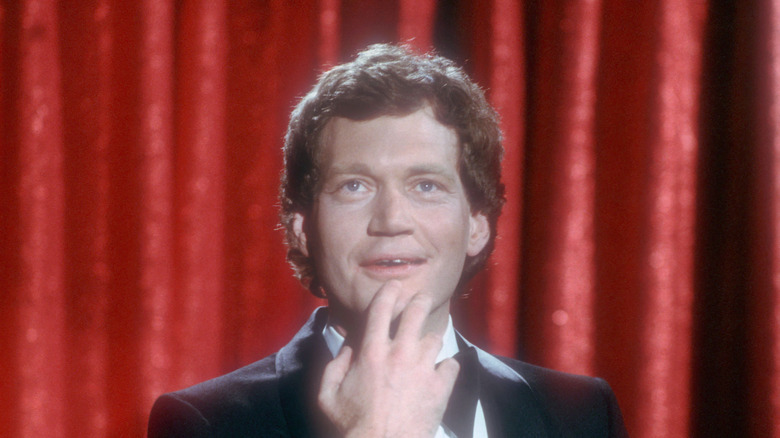What The First Episode Of Late Night With David Letterman Was Really Like
2022 marks the 40th anniversary of "Late Night with David Letterman," a talk show that broke ground in format and in tone at the time it premiered, according to Entertainment Weekly. To mark the occasion, Letterman also launched his own YouTube channel, with a selection of classic "Late Night" clips for new generations to discover, as Deadline reports. Throughout his career, Letterman was tremendously influential in comedy and in the structure of late-night television itself. Lettermen's first time hosting in the 12:30 a.m. slot reveals much of this potential was evident in his debut episode on the NBC network.
No question, Letterman was unusual from the start, and the response was mixed between critics and audiences. But that very first episode included many memorable bits that would go on to become mainstays on Letterman's shows, both on NBC and later with CBS. There are also a number of familiar faces for fans of Letterman throughout his career. His very first guest would also be his very last guest when the host retired from CBS in 2015, per Time. Looking back now, it's hard to imagine what TV comedy would be like if "Late Night with Letterman" had never premiered.
It was a morning show first
Per IMDb, David Letterman was a successful stand-up comedian and had guest-hosted the "The Tonight Show" for Johnny Carson when he was given his own show on the NBC network in 1980. But unlike the late-night audience, Letterman would find late on in his career, the first show he hosted, "The David Letterman Show" was on in the morning. The critical response to Letterman's irreverent take on late-night TV was mixed enough as it was, but Letterman's first foray into daytime TV went over even worse, according to Britannica.
Nevertheless, "The David Letterman Show" introduced TV audiences to Letterman's comedic worldview, and with audience interaction (sending an audience member out to get coffee is vintage Dave, no matter the era), as well news segments, and a full orchestra, the show set the blueprint for what Letterman's late-night premiere would be two years later in the 12:30 a.m. time slot on NBC, following Carson. Despite winning two Emmys, the Letterman morning show was canceled after only three months, as Britannica reports.
A production assistant would go on to be famous
When "Late Night with David Letterman" premiered in 1982 it marked not only a broader introduction to one of history's most influential TV personalities, it was an early big break for another comedian, Chris Elliott. Elliott was a production assistant for Letterman in the very first episode but would go on to become a writer and performer on the show, as The Daily Beast reports. Several classic sketches written by or starring Elliott are now available on the "Late Night" YouTube channel, and these days Elliott is better known for starring in the smash hit "Schitt's Creek," per IMDb.
Elliott left the Letterman show in 1988, and on the occasion of his former boss and mentor's retirement, the comedian and actor grew emotional. "I heard it on the news and I swear to god I cried. Because it was the end of an era for me," he told the Daily Beast in 2018. "I met my wife at Letterman, I started my career there, I met my best friend [and writing partner] Adam Resnick there. Dave gave me the job, gave me the income to — at a very young age — to set up a household, to own a home, to get married, to have kids ... it really hit me emotionally," Elliott said, (via The Daily Beast.)
Larry "Bud" Melman was there from the start
In addition to Elliott, several bits and recurring characters were with Letterman from the time the show premiered in the early '80s until the end of Letterman's TV run in 2015, on CBS. Most notably, the very first episode of "Late Night with David Letterman" opened with Larry "Bud" Melman played by Calvin DeForest, introducing the show with a Hitchcock-like reading of a comical intro that parodied Frankenstein, as Vulture reports.
"We are about to unfold a show featuring David Letterman," Melman said on the show, "a man of science who sought to create a show after his own image, without reckoning upon God. It's one of the strangest tales ever told," (via Vulture.) If that didn't prepare an audience for what would unfold, it's not clear what would. DeForest — who died in 2007 — did not make the transition from Letterman's NBC show to CBS, but would stay with Letterman until the end of his run on the Peacock Channel in 1993, according to The Hollywood Reporter.
There was welding ... because why not?
Also appearing with Letterman on his first late-night outing was a very young Paul Shaffer, the TV host's bandleader throughout his career, even though by the end of the run Shaffer looked like another person entirely. Much more important than the faces on the "Late Night" debut, the episode clearly sets precedent for Letterman's unique brand of funny. From showgirls wearing peacock headdresses ushering in Letterman's opening monolog to Letterman's lovably cranky persona, one of the most unusual — and classically "Letterman" of all the bits on the show came in the bumps to commercial.
Per Vulture, the inaugural Letterman late-night episode featured a fake man-on-the-street sequence asking the average people of New York what they would like to see most on the show (similar bits would repeat throughout Letterman's entire TV career.) When the response was, "demonstrations of various ways of joining metal," Letterman did what only Letterman would do and transitioned the show to commercial breaks with exactly that: footage of people welding. Letterman also wanted to show the audience what happened behind the scenes on the show, and in the '82 installment, he took cameras to the TV control room for a behind-the-scenes look.
What was up with the Oktoberfest party?
In true Letterman fashion, what was revealed when cameras turned toward the control room of the show were not TV professionals hard at work, but instead, an Oktoberfest Party done up right with music and beer, as the IndyStar reports. Dave also took the audience on a tour of the backstage, casually pulling loose a bit of the stage rigging before sounds of crashing were heard. In front of the set's spiral staircase, he added, "People ask me, Dave, where do the really big stars live here at NBC," the answer, of course, was up that staircase.
As quickly as that, Letterman moved on to lampoon the catering before opening the door to the green room full of, you guessed it, green plants and vegetables. While leading his tour, Letterman said "these are some of the few of the vegetables here at NBC not in programming," his devilish gap-toothed grin in full effect (via YouTube.) To fully create the somewhat chaotic production style Letterman came to be known for, at one point a producer is seen entering the wrong side of the stage only to crawl underneath the camera while Letterman ridiculed him all along the way.
The world's tiniest police station
Letterman's tour wasn't just limited to the studio. The "Late Night" cameras also took audiences out on the street for the so-called "Shame of the City" segment, in which Letterman himself (who was always best in off-the-cuff real-world scenarios) spontaneously interviewing restaurant workers about misspellings in their signage. He even dropped by what's known as the world's "tiniest" police station in New York City, amounting to not much more than a telephone booth. (via YouTube.)
Also not to be missed in the first-ever "Late Night with David Letterman" are the science experiments Letterman conducted with Mr. Wizard, a science and education-based entertainer at the time. These segments included setting a row of matches on fire, but most importantly this laid the groundwork for some of Letterman's most iconic TV bits like "Stupid Human Tricks," and "Stupid Pet Tricks," (via Entertainment Weekly.) The Letterman "Top 10 List" would not make an appearance until 1985, as the Los Angeles Times reports.
His first guest got physical
Iconic bits aside, what talks shows are about are the guests, and Letterman's premiere had none other than comedian, "Saturday Night Live" alum, and actor Bill Murray, as previously mentioned, whose dry, deadpan delivery and wry sense of humor matched Letterman's style. So much so Murray would go on to be the last guest of Letterman's NBC series before he switched networks, the first guest on his new CBS show, and his last guest of all when Letterman retired in 2015.
Murray did a lot more than just talk in his first appearance with Letterman. After the show returned from commercial, he inquired with Shaffer and the other musicians as to whether they knew the Olivia Newton-John classic "Physical," to which Murray proceeded to sing and dance — if that's what you want to call it (via YouTube.) Other classic bits from Murray's first appearance as a guest on the show include apologizing for his erratic behavior due to "a salt imbalance" and apropos of nothing, Murray quipped "I had a chance to strangle Richard Nixon, and I didn't. And I regret it."
Critics didn't love it
On the eve of the 40th anniversary of "Late Night with David Letterman," the TV host chatted with Seth Meyers, the current caretaker of Dave's former 12:30 a.m. time slot. In the segment Letterman said he felt "fantastic" about the 1982 premiere, adding, "And then that lasted until my feet hit the floor in the morning, and then the paralytic fear starts all over again," he said (via Deadline.) Critical response to the goofy, frenetic, and unconventional tone of the show was mixed.
The Los Angeles Times wrote that it didn't quite "jell," (per Rolling Stone). But AP television writer Fred Rothenberg wrote that the spontaneity and surprise of the show was a "welcome liberation from conventional talk shows." For their part, audiences were all in, and "Late Night with David Letterman" bested Tom Snyder's show "Tomorrow," by 30% or an additional 1.5 million viewers — Snyder's show was previously in the "Late Night" time slot. Critics and audiences would eventually agree, proving with the premiere of "Late Night with David Letterman" changed TV for the better.
